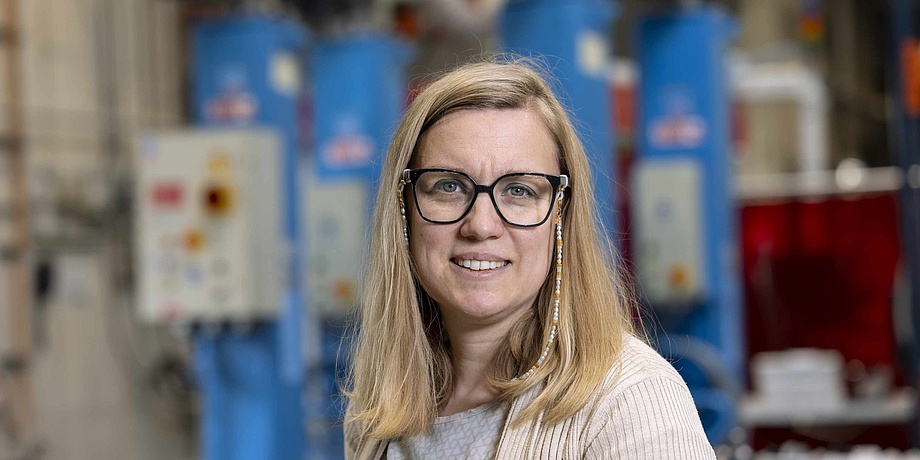06:00 The alarm clock rings. Cornelia Lex gets up and her partner Markus prepares coffee for the two of them. Daughter Annika is woken up and then they have breakfast together. At around 07:30, the two ladies leave their home in Liebenau and – depending on the weather – cycle or take the bus to the nanoversity.
08:00 Cornelia says goodbye to her daughter and sets off for Inffeldgasse 11.
8:15 Before heading up to the office, Cornelia Lex likes to take a detour to the workshop area that she used to manage for years. She checks some measurements on the test rig and discusses the results with student assistant Anna Erlach.
8:45 After arriving at the office, the scientist checks her emails.
9:30 Coordination meeting with Samra Becirovic and Adisa Moric from the office. Lex approves various orders and accounts, and as head of the institute she is responsible for over 40 employees.
10:30 Weekly group leader meeting with Arno Eichberger and Mario Hirz. The Institute of Automotive Engineering has four research groups, which are headed by Arno Eichberger, Mario Hirz, Peter Fischer and Cornelia Lex. ‘Even though I’m currently in charge of the institute, I’m not a lone wolf at the top,’ emphasises the 42-year-old, ‘we divide things up and make the big decisions together.’
12:30 Lunch. She doesn’t have a favourite dish: ‘I love trying out new things!’
14:00 Cornelia Lex has a meeting with Ludwig Schubert, one of her seven PhD students, and discusses research findings with him. ‘I’ve come to like this role of looking at results from a distance and setting up the so-called research design. To consider how a test series or simulation has to be set up so that we can answer the questions we have."
15:00 Phone call with Stefan Hausberger from the Institute of Thermodynamics and Sustainable Propulsion Systems. The multidisciplinary lead project NExT, which the two are jointly coordinating, was launched in March. TU Graz is funding this lead project in which 25 researchers and six laboratory and test rig employees are involved to the tune of almost 1.9 million euros. ‘I like working in teams and we are an interdisciplinary department, so there are many points of contact with colleagues, including those from other faculties. Many things in research are only viable if you bring in expertise. Teamwork also makes the work much more exciting and fewer things are overlooked together.’ → More about the lead project.
16:00 Most of the institute’s research projects are carried out with partners from industry. Webex meeting with Stephan Bigl from AVL.
17:00 Cornelia Lex leaves the institute.
18:00 Annika’s current favourite dish is cooked at home: noodle soup. ‘She would prefer to eat it in the morning and in the evening,’ smiles Lex. While the five-year-old happily spooned up her soup, mum and dad have a cold snack in the evening. After family time together, her daughter is put to bed.
Cornelia Lex likes to spend her evenings playing the drums. She began learning drums after completing her habilitation two years ago. ‘It helps me to calm down and is great fun.’ Another big passion is gardening. In Hart bei Graz, the researcher has her own 100-m2 garden where she grows pumpkins, courgettes, aubergines and other things. Grandparents and neighbours are happy about the avid gardening activity because ‘we produce much more than we eat and give a lot away’.
Cornelia Lex started her career at the Institute of Automotive Engineering 17 years ago as a university assistant with a PhD position. Today she is the interim head of the institute.
The TU Graz Racing Team awakened a love of automotive engineering in the then mechanical engineering student. Lex’s research focuses are on vehicle dynamics and tyres. She also focuses on tyre wear and particulate emissions in the lead project. ‘Tyre abrasion is the largest single source of microplastics occurring in the natural world, and I want my research to help reduce it. Abrasion from a single tyre amounts to 1.5 kg in its service life. These particles make up a large proportion of traffic-related particulate matter pollution.’
Pursuing a university career was not instilled in Cornelia Lex; she is the first in her family to pass her matriculation exams at school and study for a degree. Her parents were initially quite sceptical about their daughter’s choice of studies. ‘But I never doubted it myself. When I was 15, I happened to do an internship in the design department at Knapp and from then on I was fascinated by mechanical engineering.’

